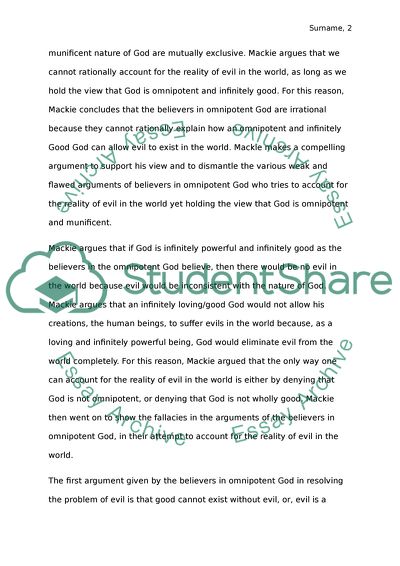Cite this document
(A Critical Analysis of James Mackies Argument on the Problem of Evil Essay Example | Topics and Well Written Essays - 1500 words, n.d.)
A Critical Analysis of James Mackies Argument on the Problem of Evil Essay Example | Topics and Well Written Essays - 1500 words. https://studentshare.org/religion-and-theology/1822569-take-a-closer-look-at-james-l-mackie-and-argue-if-he-was-justified-in-claiming-that-believers-in-an-omnibenevolent-god-are-irrational
A Critical Analysis of James Mackies Argument on the Problem of Evil Essay Example | Topics and Well Written Essays - 1500 words. https://studentshare.org/religion-and-theology/1822569-take-a-closer-look-at-james-l-mackie-and-argue-if-he-was-justified-in-claiming-that-believers-in-an-omnibenevolent-god-are-irrational
(A Critical Analysis of James Mackies Argument on the Problem of Evil Essay Example | Topics and Well Written Essays - 1500 Words)
A Critical Analysis of James Mackies Argument on the Problem of Evil Essay Example | Topics and Well Written Essays - 1500 Words. https://studentshare.org/religion-and-theology/1822569-take-a-closer-look-at-james-l-mackie-and-argue-if-he-was-justified-in-claiming-that-believers-in-an-omnibenevolent-god-are-irrational.
A Critical Analysis of James Mackies Argument on the Problem of Evil Essay Example | Topics and Well Written Essays - 1500 Words. https://studentshare.org/religion-and-theology/1822569-take-a-closer-look-at-james-l-mackie-and-argue-if-he-was-justified-in-claiming-that-believers-in-an-omnibenevolent-god-are-irrational.
“A Critical Analysis of James Mackies Argument on the Problem of Evil Essay Example | Topics and Well Written Essays - 1500 Words”. https://studentshare.org/religion-and-theology/1822569-take-a-closer-look-at-james-l-mackie-and-argue-if-he-was-justified-in-claiming-that-believers-in-an-omnibenevolent-god-are-irrational.


